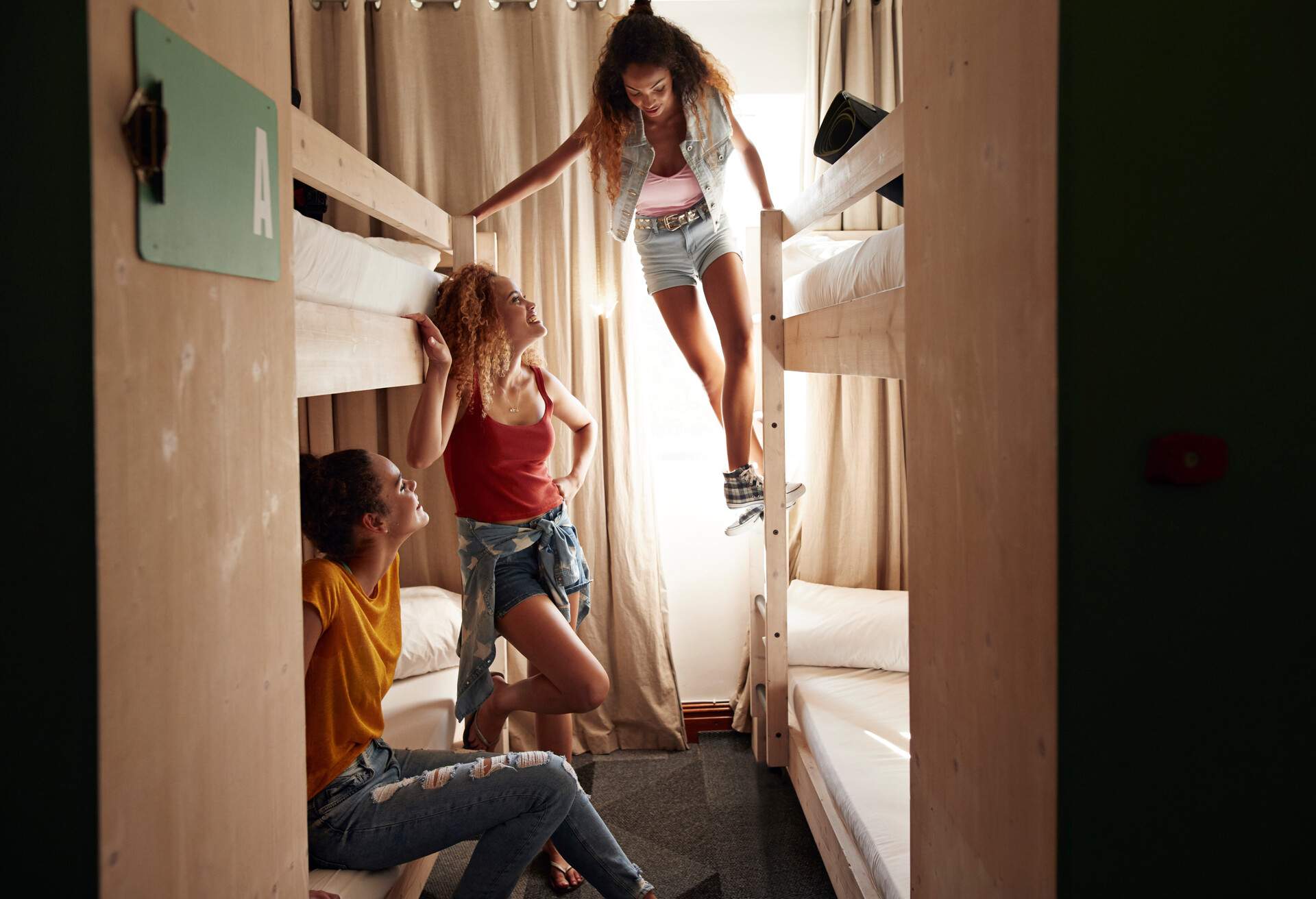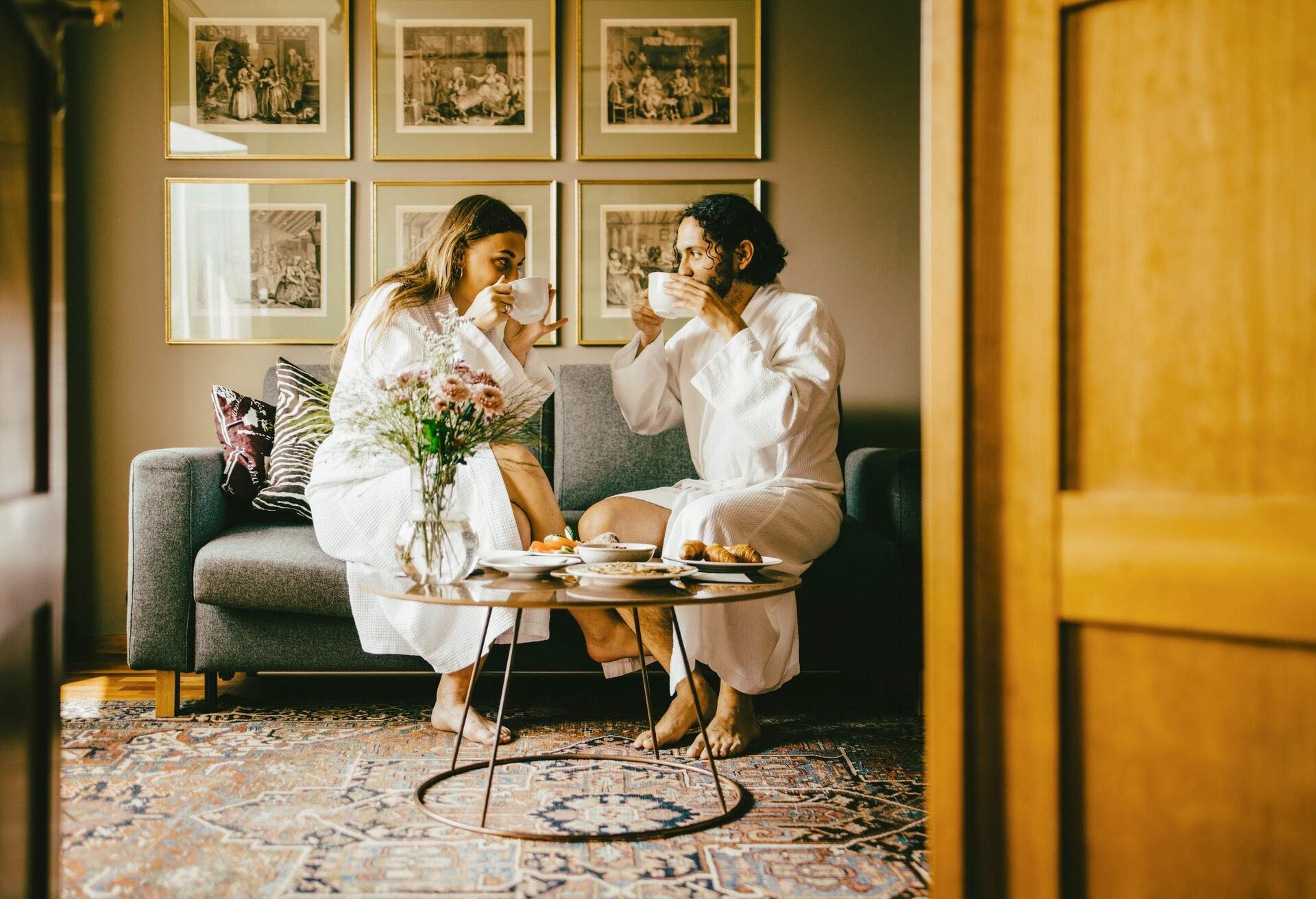I’ve stayed in more hostels than I can count, and most of them have been different from one another. Once, I stayed in a hostel in Quito – $5 (about 4£) a night got you a bed in a dorm-style room and a giant silver bowl of rum and coke (plus some cockroaches for roommates).
On the other end of the spectrum, the design hostel I stayed at in Copenhagen rivalled some of the finest hotels I’ve been to. But all good hostels have one thing in common: they’re fun and help create great memories.
So, what is a hostel? Essentially, a hostel is just like a hotel, except you probably have to share a bathroom with other guests. For the lowest rates, you can also opt to share a room. Here, I’ve rounded up all you need to know about hostels, including how to pick the right one for you.
- What is a hostel?
- What are the key features of hostels?
- Are hostels safe?
- Benefits of hostels
- Hostel vs. hotel
- My tips for selecting the right hostel
- Finding the right hostel on KAYAK
- Some of our favourite cities to stay in a hostel
- FAQ Section
What is a hostel?
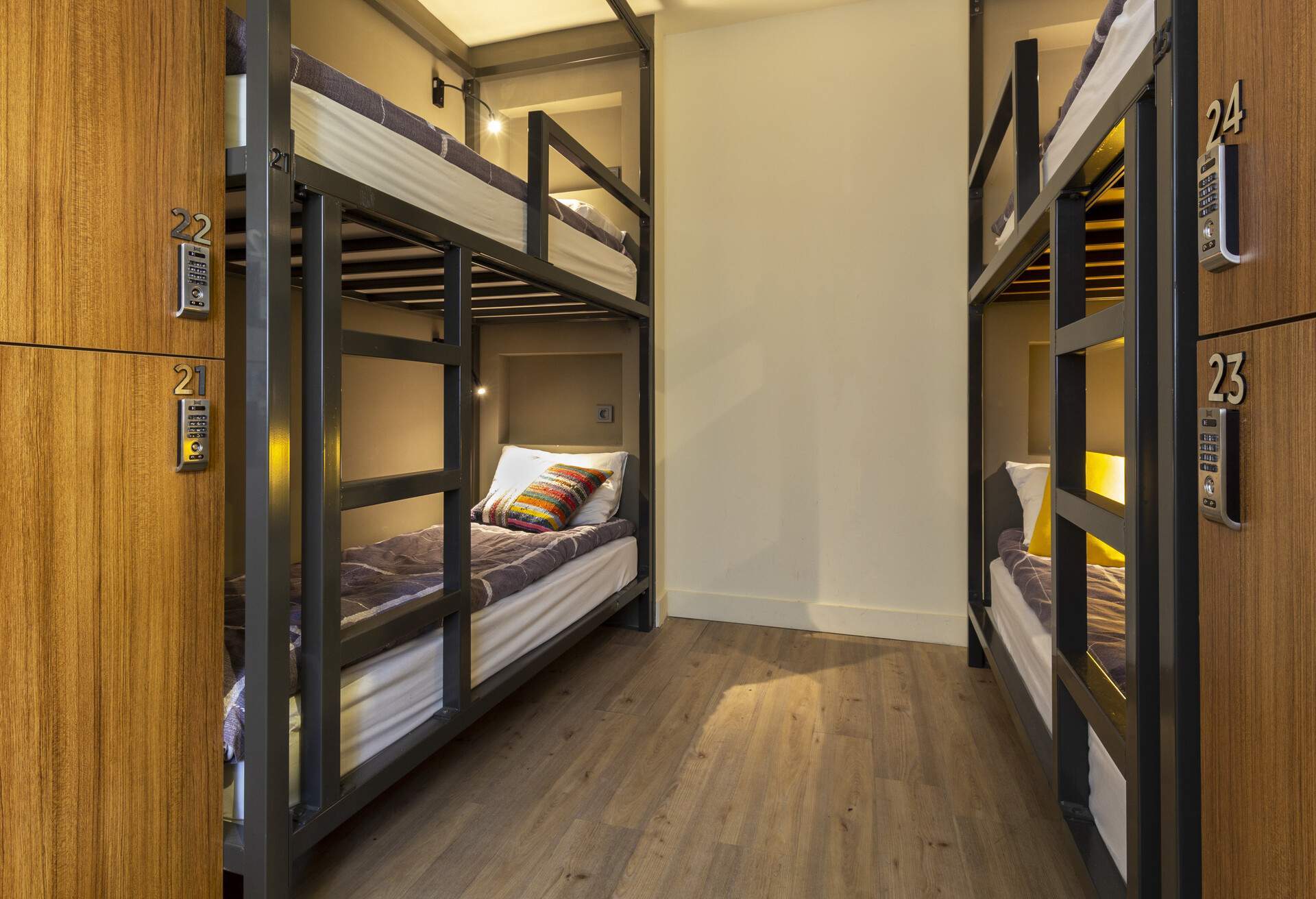
A hostel is a type of accommodation that often attracts young, budget-conscious travellers. Hostels usually offer both dormitory-style rooms and private rooms; they’re similar to hotels, except that you generally have to share a bathroom (though not always, especially if you book a private room). Hostels have some amenities and almost always have common areas like a kitchen and a lounge, although you can expect to find fewer amenities at a hostel than you would at a hotel.
Private rooms in a hostel cost more than dorm-style rooms, although they’re still cheaper than 3- and 4-star hotels. Most hostels provide bedding and a locker to hold your bags or valuables, although some may charge a fee for this. Just like a hotel, hostels provide a key card or code to access your room.
As long as you can do without some of the amenities you might find at a hotel, like a pool and a gym, hostels are a great option for those looking to save money when they travel and meet other like-minded people.
What are the key features of hostels?
Some key features of hostels include dorm-style rooms and communal bathrooms. The most common dorm room has four beds (usually two bunk beds), although there are plenty of hostels that have rooms with six, eight, or ten beds (or more). These types of rooms are almost always the cheapest. Most hostels also have private rooms, which are the most expensive option.
It’s worth noting here that many hostels offer single-sex dorms if you’d prefer not to share a room with the opposite sex. Mixed dorms are more common, though. Another key feature of a hostel is the communal areas. You can generally expect to find a large kitchen and a lounge area at most hostels. Hostels are very social places, and there’s typically some kind of event happening on any given night.
A sense of community

True story: I’ve made multiple lifelong friends in hostels. This is because hostels encourage you to hang out in their communal spaces and meet people, as opposed to hotels. As soon as you walk into a hostel, you can feel the difference — there are usually people socialising in the lounge or entryway, preparing meals in the kitchen, and making plans to go out and explore together. For people travelling solo or those who love making new friends when they go places, hostels are the best option.
I’ve met people from all over the world when I’ve stayed in hostels. I’ve cooked in kitchens with people from a dozen different countries and traded funny travel stories over endless glasses of wine. I’ve bonded with people of all different cultures, backgrounds, ethnicities, and religions. Truly, some of my most memorable travel experiences have happened in hostels.
Budget-friendly accommodations
Even in more upscale hostels, you can expect to pay less for a room than you would at a 3-star hotel. Because you usually share a room and bathroom with other travellers, hostels are almost always the cheapest option. For this reason, if money’s tight and/or you’d rather spend your money on a nice meal or experience, staying at a hostel is a great idea. Just keep in mind that, more and more, hostels offer private rooms to guests, and these can be relatively expensive. If you want to spend as little money as possible, opt for a dorm-style room.
Another reason that hostels are a good budget-friendly option, making them ideal for a backpacking holiday, is that they have communal kitchens with cookware, spices, and everything else you need to prepare a meal. Cooking your own meals is a great way to save money when you travel, even if you only cook one meal per day.
Many hostels also have a ‘free food’ shelf with food that other travellers didn’t use or chose to leave behind. In addition, hostel staff are always happy to direct you to affordable local places to eat.
Services and amenities
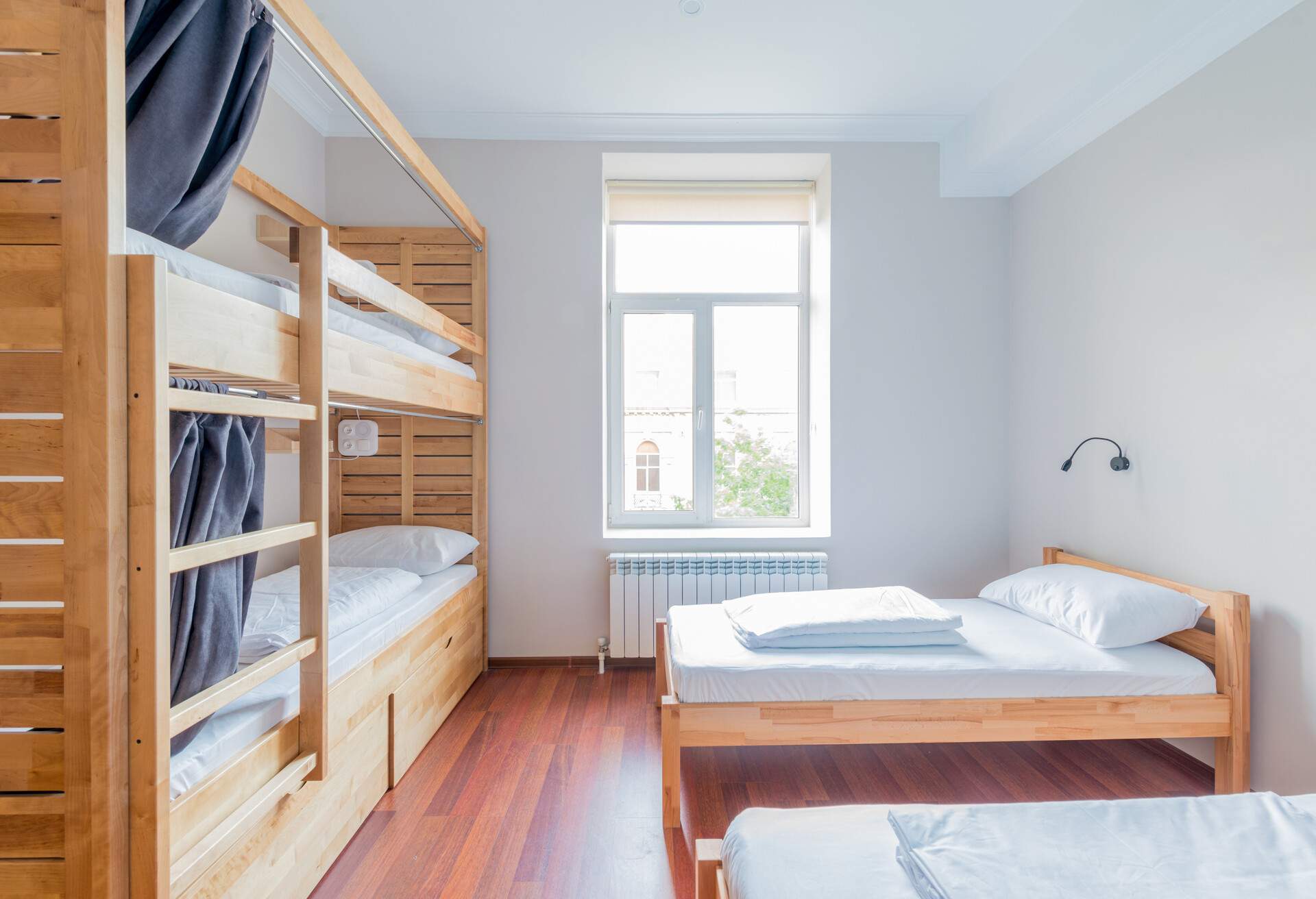
Generally, hostels offer fewer services and amenities than a hotel. This doesn’t mean they skimp on providing thoughtful extras for travellers, though. At many hostels, you’ll find laundry rooms and luggage storage. Most also have communal spaces for socialising, like a lounge area, lobby, or library.
Nearly all hostels have a kitchen that all guests are welcome to use. Some hostels may offer a complimentary breakfast included in your room rate, although this generally means little more than coffee, juice, a pastry, and fruit. There are also hostels that have their own restaurants and bars on-site. It’s common for hostels to have free WiFi all over the premises.
In terms of in-room amenities, you probably won’t find a coffee maker, iron, toiletries, telephones, TVs, or other luxuries that you’d find in a hotel room. Most hostel rooms are bare-bones, with just a bed. Rather, you can usually find these amenities in hostel common areas. For instance, there’s likely a TV in the lounge area, a telephone available for public use, and an iron and ironing board that you can use for a fee.
Are hostels safe?
Hostels are no more or less safe than hotels, it all depends on the location you’re in. Of course, if you’re staying in a shared room with people you don’t know, there’s always an increased risk of theft. But that’s why hostels offer lockers, so you can store your valuables at night. Many hostels also have 24-hour receptions, just like hotels do.
A good way that you can ensure that a hostel is up to your standards is to utilise KAYAK’s hotel reviews and review scores. This way, you can understand exactly what the experience will be like before you book. Reviews like these help provide peace of mind that you’re staying in a trustworthy place with ample security measures.
Take some time to read reviews and look at each hostel’s score, so you can be sure you have a comprehensive impression of each place.
Benefits of hostels

There are so many benefits to staying in a hostel. I’m a bit of an introvert and sometimes struggle to meet people when I travel, so for me, one of the biggest benefits of staying in a hostel is the chance to interact with other travellers. I also love meeting people from different cultures, and hostels are always brimming with travellers from all over the world. I’ve met tons of people in hostels that I never would have had I opted to stay in a hotel.
Another benefit of hostels is the price. There have been many times in my life when I’ve been on a strict budget but still wanted to explore new places, and hostels have been a godsend in those cases. For those of us who don’t have a lot of money to travel, staying in a hostel can mean the difference between going totally broke and being able to stay under budget. I’ve gotten to travel longer and cheaper by booking hostels, and it’s always been worth any sacrifices I have had to make (like sleeping with strangers or not having a TV in my room).
There are lots of other benefits of hostels. You’ll enjoy access to free WiFi and generally friendly staff who are passionate about giving travellers recommendations. Most hostels organise weekly or even nightly events, so there’s always something fun going on. But for me, the best part is saving money and meeting people from all over the globe.
Hostel vs. hotel
Wondering what the real differences between a hostel and a hotel are? Think of a hostel as shared dorm lodging and a hotel as private lodging. Even if you’re renting a private room in a hostel, it’s still a much more communal experience than at a hotel.
The other primary difference when it comes to a hostel vs a hotel is the price. Dorm-style rooms are much cheaper than hotel rooms because you’re sharing a room with other people. It’s important to keep in mind that hostel prices vary around the world, and prices could fluctuate wildly depending on when you travel — that said, hostels are nearly always cheaper than hotels.
Of course, there are those for whom the hostel experience isn’t the right fit. If you’re someone who’d rather stay in a hotel, but would still like to meet new people and get out and socialise, use KAYAK’s Hotel Heat Map. This helpful tool shows you which hotels are near all the best restaurants, shopping, nightlife, and cultural attractions in town. So, you can pick a hotel that’s located as close to all the action as possible.
My tips for selecting the right hostel
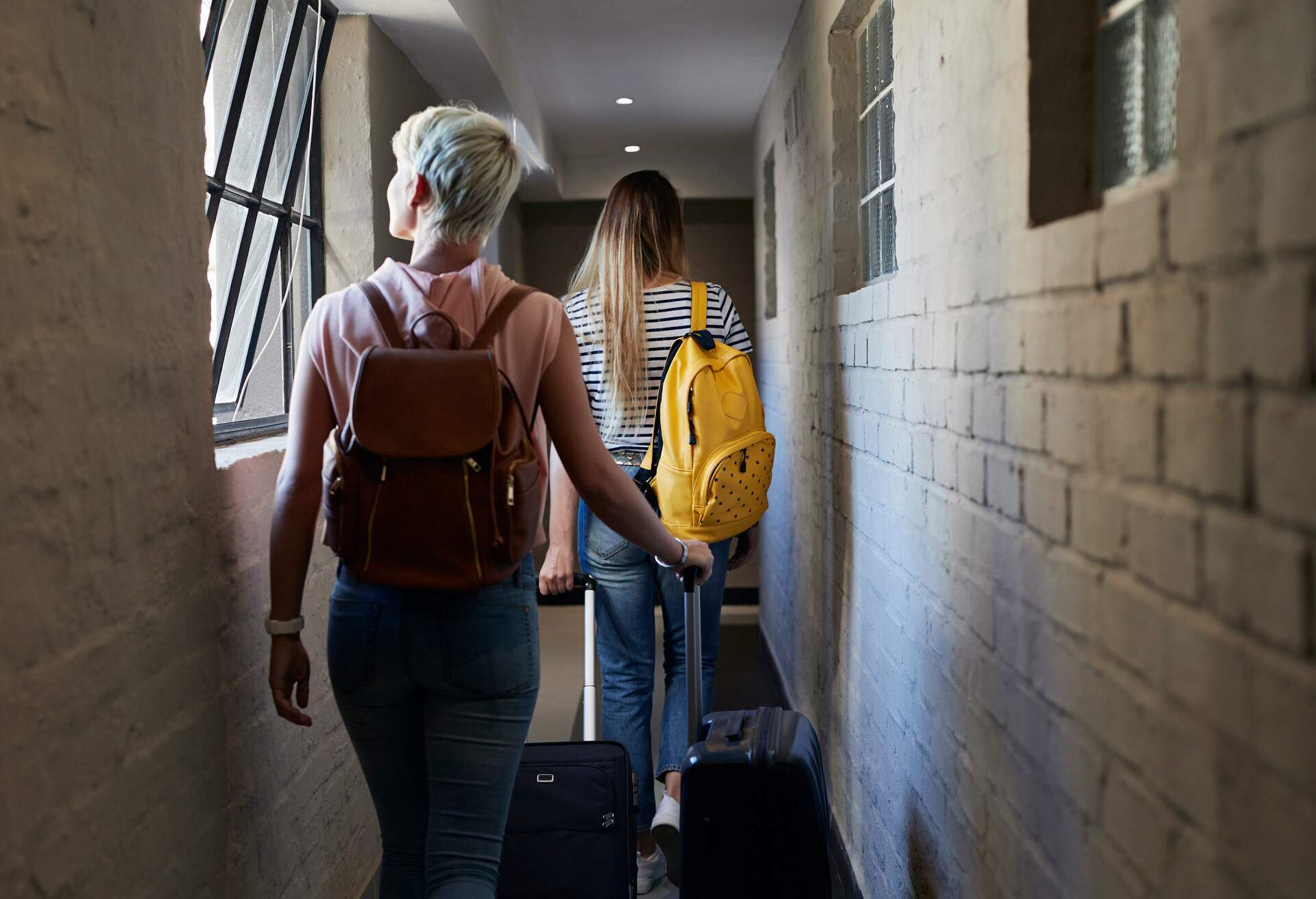
Not all hostels are created equal. There are some hostels that are truly budget-friendly, with cheap dorm rooms and little to no amenities. There are others that are considered ‘design’ or ‘luxury’ hostels, and these more closely resemble boutique hotels. And there are all kinds of hostels in between.
My advice is to decide which type of hostel you want to stay in, so you don’t end up blowing your budget or staying somewhere that’s less upscale than you expected. If you’re travelling on a strict budget, seek out a hostel that has more dorm rooms than private rooms and doesn’t come with fancy ‘extras’. If, on the other hand, you want to stay somewhere a bit nicer, you can search for ‘luxury hostels’ in any given destination.
Finding the right hostel on KAYAK
To find all the hostels that are available in the destination you are looking for, look for the Style Filter on the left part of the search result page and see your options change in real-time. After that, the KAYAK Review Score, which is based on user reviews, will help you make the best decision. Want to be in the middle of all the action? The KAYAK heat map will show you which accommodations are near restaurants, sightseeing, nightlife, and shopping.
If you enjoyed this, you might also find our other blog posts about holidays for any budget and the best cheap holiday destinations interesting.
Some of our favourite cities to stay in a hostel
Some of the most exciting cities to stay in a hostel include London, Edinburgh, Chicago, Amsterdam and Dublin. These places are known for their buzzworthy hostels that range from cool boutique-style accommodation with unique amenities to luxury hostels that feel more upscale resort than backpackers’ lodging. Check out the KAYAK explore tool to find all the best hostels in a particular city.
Hostel FAQs

Who can stay at a hostel? Is there an age limit?
The majority of hostels prohibit guests under the age of 18 from staying in dorm rooms, although private rooms are usually exempt from this restriction. In some places, you may encounter a 21-and-under limit. In others, the age limit may be 16. In addition, some hostels may employ a rule that restricts guests to 30 or 40 and under — these are generally places that have a bar inside and want to have a youthful vibe (this is relatively rare). All this to say: yes, there are generally age limits in hostels, but you’ll want to enquire with each individual hostel to find out their policy, as it can differ quite a bit.
Can children stay at hostels?
Generally speaking, you won’t be able to book a dorm room if you’re staying at a hostel with children. But most hostels do welcome children as long as you book a private room. Some party-centric hostels may only take guests that are over the age of 18 (but you wouldn’t want to stay in these with children anyway).
Can I bring my pet when I stay at a hostel?
Yes, there are pet-friendly hostels. Expect to pay an additional fee if you opt to bring your pup to a hostel, and you likely won’t be able to stay in a dorm room (you’ll have to stay in a private room instead). Not all hostels are pet-friendly, though; be sure to enquire about this before booking.
Do I need a sleeping bag/bedding?
Most hostels provide clean sheets, a comforter, and a pillow as part of the room rate, so you don’t need to worry about bringing your own bedding or sleeping bag. Some hostels on the more affordable side of the spectrum may require guests to ‘hire’ their bedding for the night for a small fee.
Do I need to bring towels?
Most hostels provide towels, although many might require you to place a deposit or borrow a towel for a fee. In general, you’re better off bringing your own towel to a hostel. Invest in a good quick-dry towel before your trip, to save money and also ensure that you’ll have a towel no matter where you stay.

